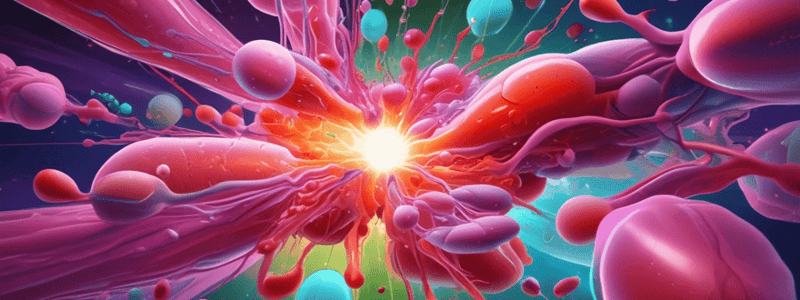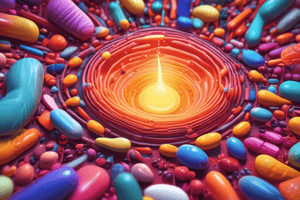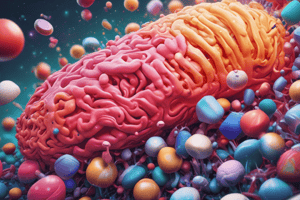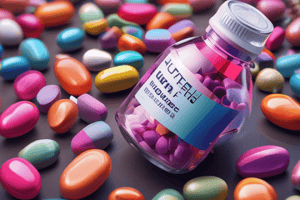Podcast
Questions and Answers
Match the following with their mechanism of action:
Match the following with their mechanism of action:
Organic Nitrates = Works directly on smooth muscle to promote dilation of veins Quinidine = Both tachy and brady mechanisms Nitroglycerin = Promotes dilation of veins Anti-dysrhythmias = Changes in the EKG
Match the following with their therapeutic uses:
Match the following with their therapeutic uses:
Quinidine = First line for African-American population BP, HF & hypertensive crisis Organic Nitrates = Used for angina pectoris Nitroglycerin = Works for angina pectoris Anti-dysrhythmias = Used for dysrhythmias
Match the following with their adverse effects:
Match the following with their adverse effects:
Quinidine = Anorexia*--an early sign of toxicity Organic Nitrates = Headache Nitroglycerin = Orthostatic hypotension and reflex tachycardia Anti-dysrhythmias = CNS and GI adverse effects
Match the following with specific drugs:
Match the following with specific drugs:
Match the following with potential drug interactions:
Match the following with potential drug interactions:
Match the following drugs with their primary therapeutic uses:
Match the following drugs with their primary therapeutic uses:
Match the following drug classes with their mechanism of action:
Match the following drug classes with their mechanism of action:
Match the following adverse effects with the associated drugs:
Match the following adverse effects with the associated drugs:
Match the following drugs with their specific usage:
Match the following drugs with their specific usage:
Match the following drug interactions with the associated medications:
Match the following drug interactions with the associated medications:
Match the following cardiovascular system medication with their mechanism of action:
Match the following cardiovascular system medication with their mechanism of action:
Match the following cardiovascular system medication with their therapeutic uses:
Match the following cardiovascular system medication with their therapeutic uses:
Match the following cardiovascular system medication with their adverse effects:
Match the following cardiovascular system medication with their adverse effects:
Match the following cardiovascular system medication with their specific drugs:
Match the following cardiovascular system medication with their specific drugs:
Match the following cardiovascular system medication with potential drug interactions:
Match the following cardiovascular system medication with potential drug interactions:
Match the following cardiovascular medication category with its primary mechanism of action:
Match the following cardiovascular medication category with its primary mechanism of action:
Match the following cardiovascular medication with its major therapeutic use:
Match the following cardiovascular medication with its major therapeutic use:
Match the following adverse effects with the corresponding medication category:
Match the following adverse effects with the corresponding medication category:
Match the following cardiovascular medication with its specific use:
Match the following cardiovascular medication with its specific use:
Match the following drug classes with their primary mechanism of action:
Match the following drug classes with their primary mechanism of action:
Flashcards are hidden until you start studying




